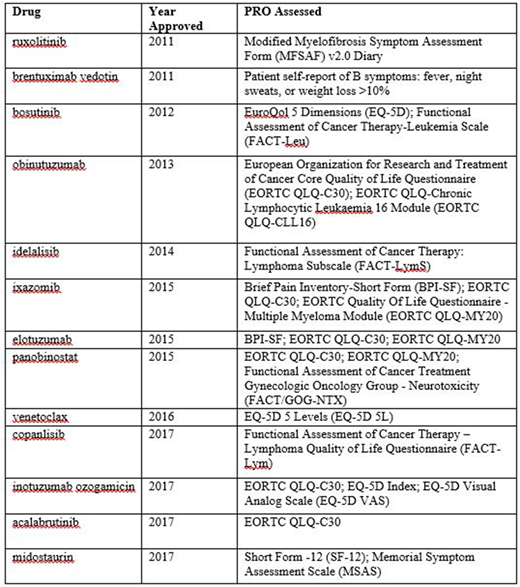Abstract
Introduction: Patient-reported outcomes (PROs), defined as any report on the status of a patient's health condition that comes directly from the patient without interpretation by anyone else, play an increasingly important role in drug development. In 2009 the FDA issued final guidance on using PRO measures to support labeling claims, to incorporate the patient perspective into the drug approval process. The 21st Century Cures Act emphasizes PROs as a differentiating element in the FDA approval process of new drugs, beyond traditional clinical outcome measures. Further, recent data has shown that intervention based on PROs can improve survival in metastatic cancers (Basch et al; 2017). The incorporation of PROs into the labeling of new drugs for malignant hematology disorders has not been studied and is the subject of this investigation.
Methods: We reviewed the FDA's Novel New Drug Summaries (2011-2017) to identify drugs approved for malignant hematology indications. Drug approval packages and product labeling were accessed via the Drugs@FDA database and analyzed for PRO endpoints, measures, and labeling claims. Clinical trial designs and published study results were retrieved via the ClinicalTrials.gov website and PubMed.
Results: Of 250 novel drugs approved by the FDA between 2011 and 2017, 22 (8.8%) were approved for malignant hematology indications. Interestingly, only 1 had PRO-based claims in their labeling, even though 13 of the 22 drugs (59%) collected PRO data in pivotal trials that led to their approval. Notably, the proportion of malignant hematology trials assessing PROs has increased over time, with 4 of the 5 drugs approved in 2017 for malignant hematology indications evaluating PROs in their development programs, compared with 9 of the 17 drugs approved in the preceding 6 years (80% vs. 53%). PROs evaluated included generic instruments such as the EQ-5D, and disease-specific instruments such as the EORTC QLQ-C30 (see table). Reasons cited for rejection of PRO data inclusion in drug labeling were single arm trial design, excessive missing data, statistical issues, and use of an inappropriate PRO instrument.
Conclusions: While the FDA encourages PRO data submission as part of the new drug approval process, and although more than half of all malignant hematology drugs approved in the past 7 years assessed PROs during development, only 1 was able to successfully acquire labeling claims. Whether this is due to lack of PRO expertise on clinical development teams or absence of strong regulatory guidance on how best to implement PROs remains unknown and requires further research. Designing strategies to develop, validate and report PROs effectively is needed to meet regulatory requirements and enhance patients' voices in their own care.
Nabhan:Cardinal Health: Employment, Equity Ownership.
Author notes
Asterisk with author names denotes non-ASH members.


This feature is available to Subscribers Only
Sign In or Create an Account Close Modal